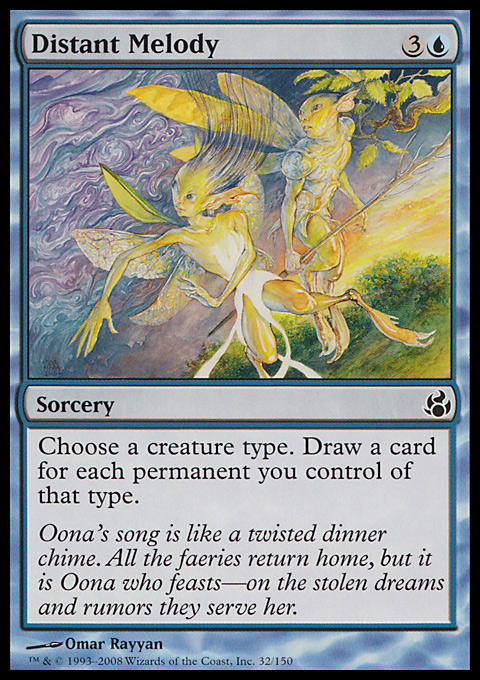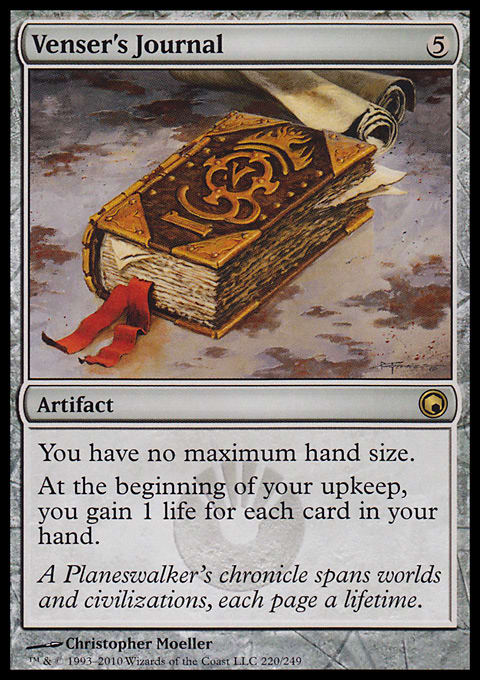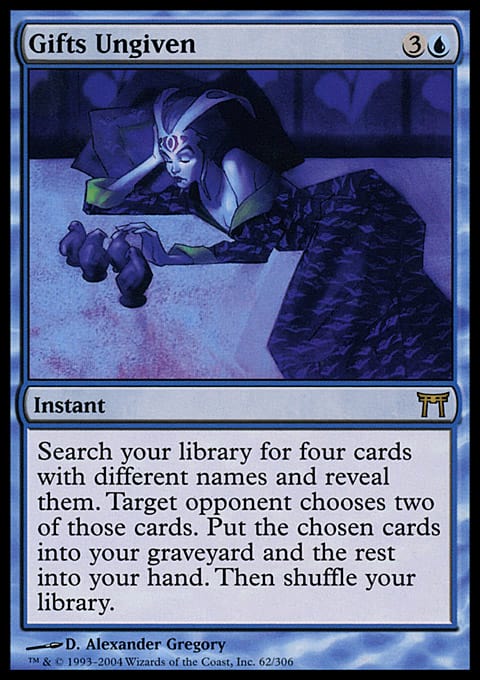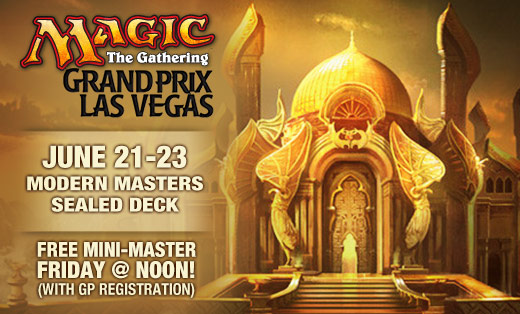During one particular Standard tournament at the store—this was back around the time of Champions of Kamigawa block and the Greater Gifts deck that Frank Karsten Top 8’d Worlds with—I sat down to play against a friendly guy by the name of Bill.
Bill was a regular Pro Tour Qualifier player and was well known locally and in the Midwest generally. He had an easy way of getting along with other gamers and made a point of networking, meeting people, and generally being a helpful player.
So, Bill did what Bill does when sitting down to play someone he just met and started introducing himself. At some point, we had the following exchange, truncated substantially to account for my rapidly fading memory (getting older is tough, yo):
Bill: “I go to Cornell College.”
Me: “Oh, I went to Cornell College.”
Bill: “Cool. I’m the Sports Editor of the school paper.”
Me: “Huh, I was the Sports Editor of the school paper.”
Bill: “I’m an English Major.”
Me: “That’s stupid.”
That last exchange may not have happened, but the first two certainly did. We talked more about writing, about journalism, and about the state of The Cornellian, our shared college newspaper. He then soundly defeated me with Kodama of the North Tree. I think. Given Bill’s proclivities, it was probably some mono-colored aggro deck.
And that was step one in how I became a Magic writer.
Know the Community
Every day, there are new, aspiring Magic writers popping up on websites all over the Internet. Some are good; most are not. But there’s something about Magic that inherently makes players want to share their experiences, and despite the advent of video, most of that long-form sharing of ideas takes place in the form of articles.
So, what I’m going to do today is walk through not only my journey to being a Certified Magic Journalist (Note: not actually a thing), but what it takes to make it to the point where people will actually pay for you to write about Magic—as this very website does and as Wizards of the Coast has somehow been conned into doing for me for the last few years.
So, how did I end up as an official writer for the Wizards of the Coast coverage team? Truth be told, I have Bill to thank for much of that.
(Note that while I do coverage for them officially and regularly, I am not an employee of Wizards of the Coast. It’s basically freelance.)
The Bill in my story, you see, is Bill Stark. Bill Stark, if you don’t know, is Kind of a Big Deal in the Magic world (at least in his own head). At the time, he was basically what I am now . . . a regular contributor to the Wizards coverage team. He also had a website called The Starkington Post. Or maybe that was Ben Stark. No one really knows.
Either way, Bill was my first introduction to the broader Magic community. It was he who introduced me to Greg Collins, Wizards of the Coast coverage maestro, and it was he who helped me along for my first few coverage gigs.
My first such time doing coverage was U.S. Nationals in Baltimore, where I helped out in an unofficial capacity. I don’t recall what I worked on, but I think I was compensated in booster packs and promo cards.
From there, I became more connected and came to know more and more people. Today, I count the Rich Hagons, Nate Prices, and Marshall Sutcliffes of the world my friends—all because one guy keyed me into the larger world that is the Magic: The Gathering community.
Be Able to Write
This probably should have been number one with a bullet, but the actual ability to string together sentences, paragraphs, and entire narratives is not one to be taken lightly. The fact that you wrote papers in college and earned decent grades does not make you a writer. Good writing takes practice, and there are a fair number of poorly-written Magic pieces with great ideas that go nowhere because their prose is lacking.
Now, in reality, this one is somewhat optional. There are two kinds of Magic writers out there: those who write because they’re writers who play Magic and those who write because they’re well-known, extremely talented Magic players.
I’m a pretty good example of the first one. I’ve spent much of my life pursuing my schooling and career, and coupled with sports (I played through college), I was never able to commit much time to Magic beyond the local stage. People know who I am because I write, not because of any Grand Prix or Pro Tour success (though I’m planning to change that at GP: Houston . . . see you there!).
But the Luis Scott-Vargases of the world are Magic writers because, for the most part, they’re amazing Magic players and not because they’re writers. Now, I should say I used LSV as an example because I actually really enjoy his writing. He has a strong stylistic identity and is a good writer. In my mind, LSV is actually the intersection of the two groups I mentioned above. I use him as an example because I don’t want to pick on anyone who happens to not be a good writer.
The point is that unless you find Pro Tour success, no one will pay you to write if you can’t—you know—write. For myself, I have a graduate degree in journalism, was a reporter for nearly a decade, am a fastidious grammar snob, and know how to use words such as “fastidious.” My current job title is literally “Writer.”
While none of this guarantees I am actually worth reading (hey, sometimes I’m not . . . no one poops gold every time he or she puts fingers to keyboards), it does give me a certain cache. I’m certain Wizards of the Coast probably wouldn’t have hired a nobody to do coverage if I didn’t have a résumé at my back that proved I could do the journalism schtick. And when we recently shifted the style of our written coverage to a more sports-writing-recap style, I found myself suddenly very much in my wheelhouse.
If you’re not a good writer right now, you can certainly learn. Read other people’s work, think about what you like and don’t like, and take note. Write articles and ask for feedback. Read more coverage. Buy yourself a word-a-day calendar. Read even more coverage. Then, go back and read more coverage.
All of this will enable to you write clearly and concisely, better enabling you to convey your ideas. Mike Flores may or may not have been the first one to espouse the ideas of tempo and changing roles and how to evaluate matchups, but “Who’s the Beatdown” remains one of the seminal strategy articles in Magic because it clearly articulated Mike’s thesis.
Engage
My first writing job in Magic wasn’t for Wizards of the Coast. In fact, Wizards might never have used me if it wasn’t for the time I spent writing for what was then Brainburst and later TCGplayer.com.
For a time, I wrote a somewhat gimmicky article series called Going Infinite, wherein I recounted my winnings and losings on Magic Online and kept careful track of my expenses to show what a typical semi-grinder could do on a limited budget.
But they didn’t just hand me an article because I asked. I was asked because I was engaged with the site.
The story is that, back around that time, I played a ton of the deck Greater Gifts—a deck that revolved around Gifts Ungiven, Greater Good, and Yosei, the Morning Star. I was actually fairly good with the deck and had some success on the Grand Prix level.
One day, Frank Karsten wrote an article on the deck that had some curious choices in it—three Sensei's Divining Tops is the only one I explicitly remember, though there was something about Birds of Paradise going on, too—in an article that appeared, to me at least, to be below Frank’s normal standard (the Hall of Famer, by the way, is an excellent writer in addition to being a great Magic player) .
So, I called him on it in the forums.
I made what I thought was a reasonable argument in the forums. Frank and I started going back and forth, and at some point, I got the ban hammer.
I don’t know what I said to earn the banning, and it’s very possible I deserved it, but at the time, I was very confused. So, I wrote the owner of the website an e-mail asking, in a calm, professional manner, for an explanation. That led to a positive back-and-forth exchange that ended with him asking if I would like to take some of my ideas and put them in actual articles on his actual Magic website.
Of course I did.
I went on to write for Brainburst/TCGplayer for some time, even earning the honor of doing set reviews. Eventually, I got a big-boy job and had to move on, but if I hadn’t been involved, hadn’t been thoughtful, and hadn’t caught the eye of someone in a position to give me a break, I probably wouldn’t be writing these words here today.
Research and Interview
The most oft-neglected part of Magic writing is research. It’s not sexy, it takes more time than actually writing, and it is, strictly speaking, not always necessary. But it’s such an underserved part of Magic writing that doing something as simple as delving into data or history or information dumps can give you a massive leg up on other writers.
When doing Pro Tour coverage, I typically have about eight or so browser windows open. At the ready, I have Gatherer, past Pro Tour coverage, Wikipedia, various Wizards of the Coast pages, and Google. When I have the time and know whom I’m covering in the next round, I’ll stop and do some research on him or her, the player’s background, and more. Every bit of it helps inform and improve my writing.
But you also need to talk to people, as in Actual Humans Who Know Things. At a Pro Tour, that means sitting down with Ben Stark to talk about his Draft or Sam Black about deck-building. It can mean something as simple as checking in to see how LSV is doing in the tournament just to make sure you’re not missing a story.
And what if you’re just writing a weekly story? Still talk to people. If you know a regular pro or interact with that person on Twitter, don’t be afraid to ask him or her a question (Note: I don’t recommend barraging pros you’ve never spoken with before with questions . . . even though some of them are actually nice enough to respond.)
All of this adds richness and depth to your writing. Sure, you can tell me all about how you playtested thirty games of Junk Reanimator versus Jund, but so can anyone else. What happens if you playtest those games and then ask others for their thoughts? Or go back on coverage and review video or text feature matches that showcased those decks to find common threads? How much more value can you add, and how much can you differentiate yourself from the thousands of articles out there (my own included) that say, essentially, “Here is a deck, and here is what you should know about it.”
If you put in the work, others will notice and appreciate it.
Things I Think I’m Thinking about Grammar
Here’s the special grammar-snob edition, pulled, in part, from my own Facebook rants.
- Punctuation goes inside quotation marks ninety-nine point nine percent of the time. If you write something like this—“I know how to use grammar”, Frank said. “But quotation marks confuse me”.—there’s a very good chance I will slash your tires. Who the heck teaches that?
- I hate the Oxford comma even though it’s not incorrect to use. That said, all of the examples of why you “must” use the Oxford comma are just wrong and can easily be rewritten to avoid it. “The strippers, JFK and Stalin” is easily recast as “JFK, Stalin and the strippers.” Sometimes, you do need it for clarity’s sake, but when the Associate Press doesn’t use it—meaning virtually every newspaper in the country doesn’t—can we all assume that communication doesn’t break down into a maelstrom of confusion and dissonance because there isn’t a comma before the word “and”?
- The above is an example of the point one percent of the time when punctuation goes outside quotation marks.
- Stop putting two spaces after a period. It’s unnecessary, and it causes consistency problems for editors.
- I guarantee I have grammatical errors in this article. Feel free to nitpick. It’s how I become better.































